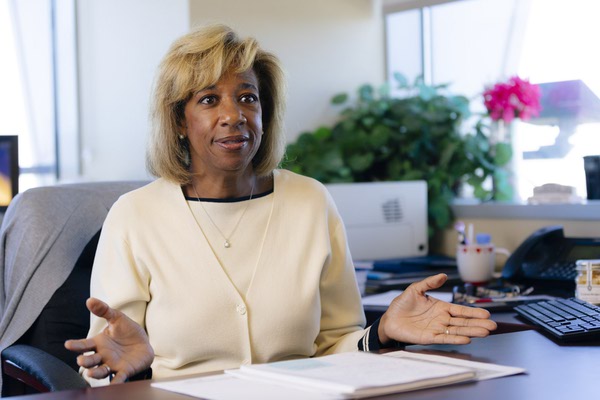The city of North Las Vegas says the Clark County School District is hurting the community it serves with a new rule requiring private sports leagues to pay for district police coverage at every game held on school property.
North Las Vegas Mayor Pamela Goynes-Brown said she had “grave concerns” with the rule that would mandate leagues be on the hook to pay upfront for the cost of at least two CCSD Police officers — who run nearly $60 per hour, per officer — for every game day. The charge for police would be in addition to fees that CCSD already charges for school custodians and the actual field rentals.
Requiring officers would only be a requirement for games — not practices. And it’s a policy only for sports, and not for other events like Scouting or churches that regularly use school space.
The Sun first reported the change in fees last week, catching the eyes of North Las Vegas officials.
“That’s going to put a huge burden on our families, especially in our disadvantaged neighborhoods,” Goynes-Brown said. “We truly believe, and we know, that school athletic fields and sports facilities are paid for, built by, provided for by citizens in our community, so you’re putting a huge burden on them if you’re going to require something like this to happen.”
A March memo from CCSD’s Secondary Student Athletics and Activities Department said school police logs showed “a majority” of sporting events contested on school property by outside groups last summer required officer responses “due to disruptive participants and other various incidents,” and that a minimum of two CCSD officers would now be required. Sports organizers cannot substitute in private security firms.
The district added that if the attendee count was “greater than what two school police officers can safely supervise, additional school police officers will be assigned.”
The district said in a Tuesday statement that “after noting safety and maintenance concerns following large group sporting events, CCSD Athletics, Facilities and Police evaluated options to protect District assets.”
It did not directly respond to the Sun’s questions about what exactly triggered the rule change and what would happen if there weren’t enough officers to go around.
Violence at youth sports events could include threatening and/or derogatory comments to a referee or the opposing team, which could escalate into physical altercations. The district hasn’t responded to questions asking how many times school police were called to events.
“Given the facility rental timeline, District departments evaluate schedules to ensure adequate police and maintenance coverage during regular District business,” the district statement continued. “Requests for facility rental will be approved based on resource availability. The District will continue evaluating the policy through dialogue with stakeholders.”
Ben Joffe, director of operations for the nonprofit National Youth Sports Nevada and a regional chairman for the national American Youth Football, is one of the biggest stakeholders in the conversation because his league uses high school football fields and gyms at various sites around town. And yet, he says he wasn’t included in the talks to bring the change.
The police costs would hike National Youth Sports Nevada’s expenses to about $17,000 per day during fall tackle football season, when its leagues use nearly 10 sites every Saturday, league officials said. The organization says it is the only one in Las Vegas offering an out-of-school tackle football league to children.
If the group were to pass the cost on to parents, Joffe estimated that it could add $40 to $50 more to registration fees.
The league’s tackle football fees — which pay for fields, awards, officials, liability insurance and league administration — currently range from $170.99 to $205.99. The league also offers flag football, soccer, basketball, baseball, volleyball and cheer.
Some of the sports are played at city parks, but many are contested at CCSD high schools.
That’s cause for concern to Goynes-Brown, who fears that inflated registration fees could price out families who rely on youth sports for their children’s recreation.
“If a child is going to participate in sports, it’s going to come down to the parents’ decision and the parents’ ability to pay for that,” Joffe said. “And the difference of an extra $40 to $50 may not seem like a lot to some people. It may change a lot of parents’ minds.”
Under the old fee structure, National Youth Sports Nevada spent about $65,000 per season of tackle football, not counting the thousands the league says it donates to host schools. The league is mostly for children ages 5-14.
Under the new rules, the cost to operate a full football season of about 10 weeks would balloon to about $174,000, league officials said. The league would stop making donations to individual schools because it would no longer be able to afford to do so, said Michael MacLeod, the organization’s director of business development.
Joffe acknowledged that sports were already expensive, and increasing the price for the police could make them cost-prohibitive “for those families that really need those activities and those kids that need that outlet the most.”
It’s not just football.
Joffe said National Youth Sports Nevada was offering a free spring soccer program at elementary schools. He said it’s a “give-back” to the community. If the police fee sticks, he’d no longer be able to have free soccer, either.
Goynes-Brown, who is also a retired CCSD teacher and assistant principal, said if children don’t have something positive to do after school, “that just speaks trouble to me, because then they’re going to get into something that they shouldn’t get into, because they have nothing else to channel their energy to.”
CCSD, like the city, is a taxpayer-funded agency, making the new rule not in the community spirit, she said.
“Our schools are not private entities,” she said. “It’s just not OK.”
[email protected] / 702-990-8949 / @HillaryLVSun

